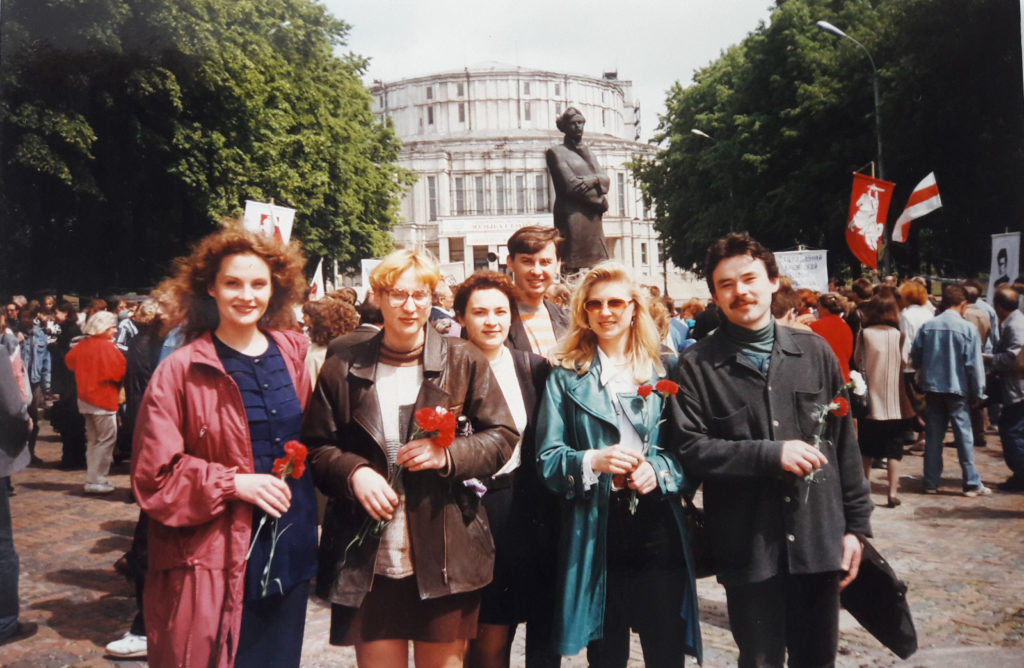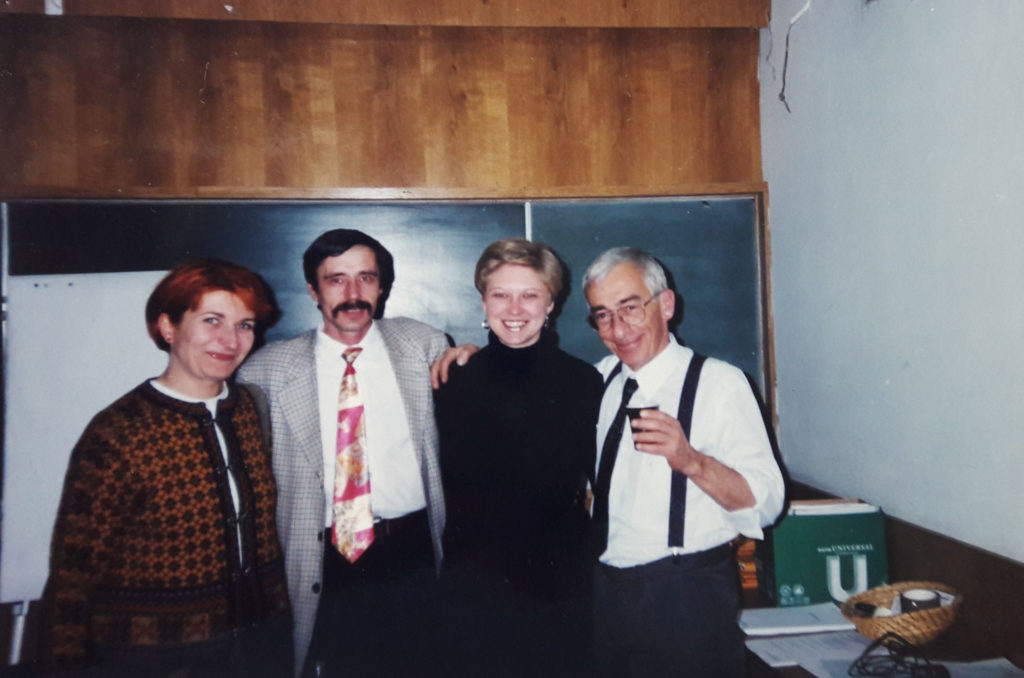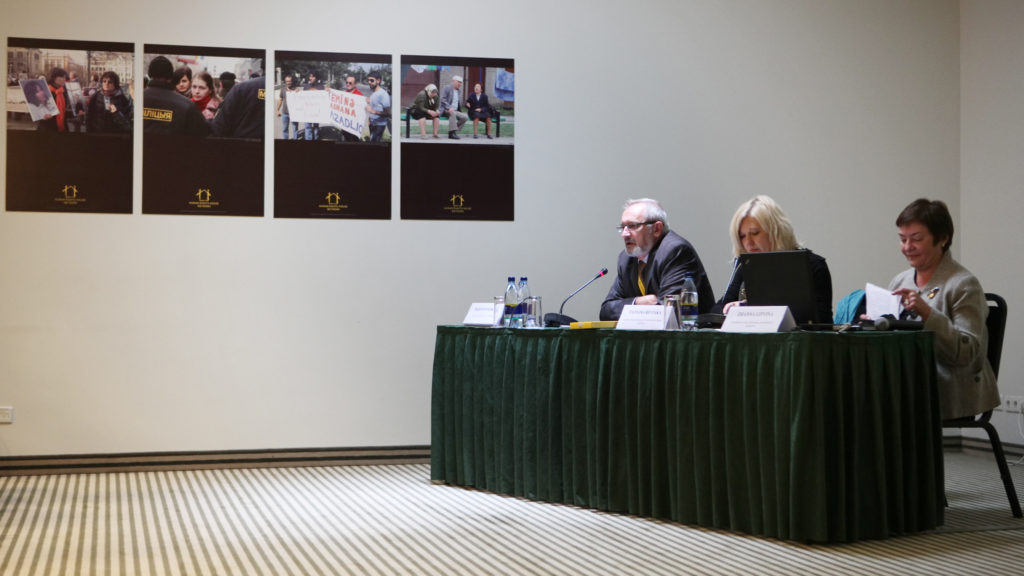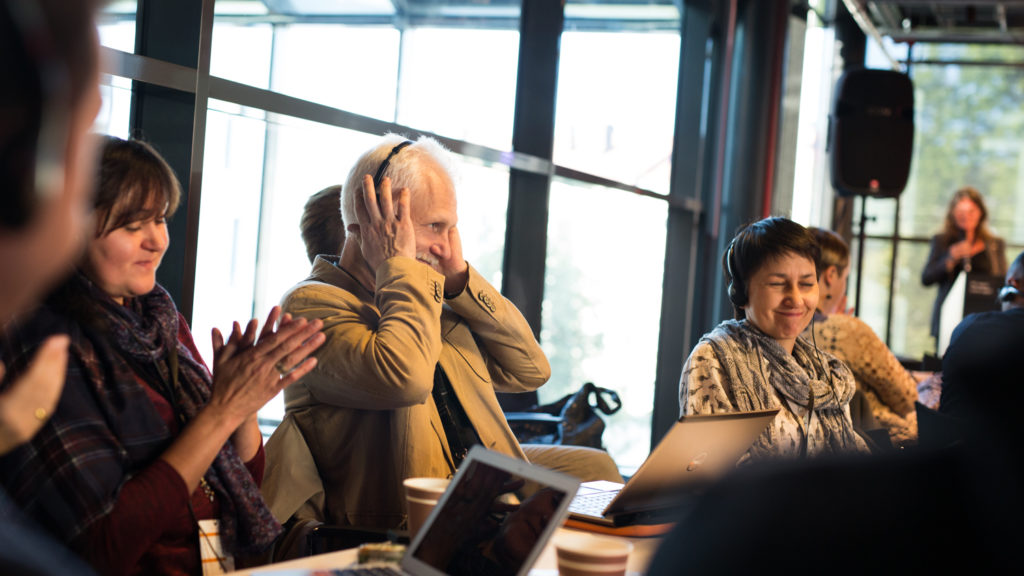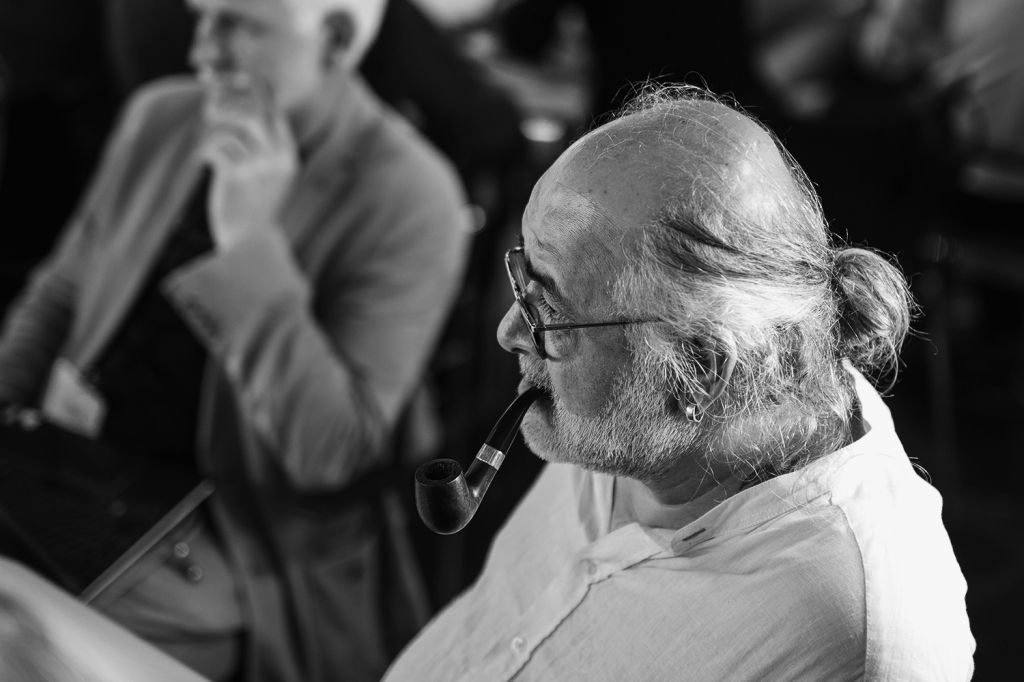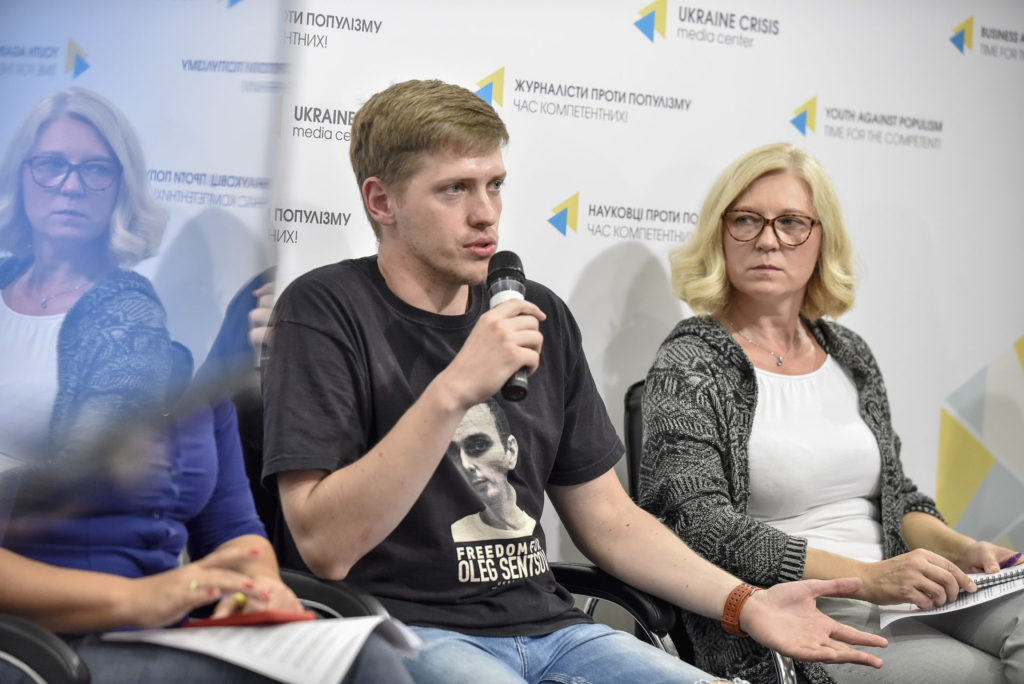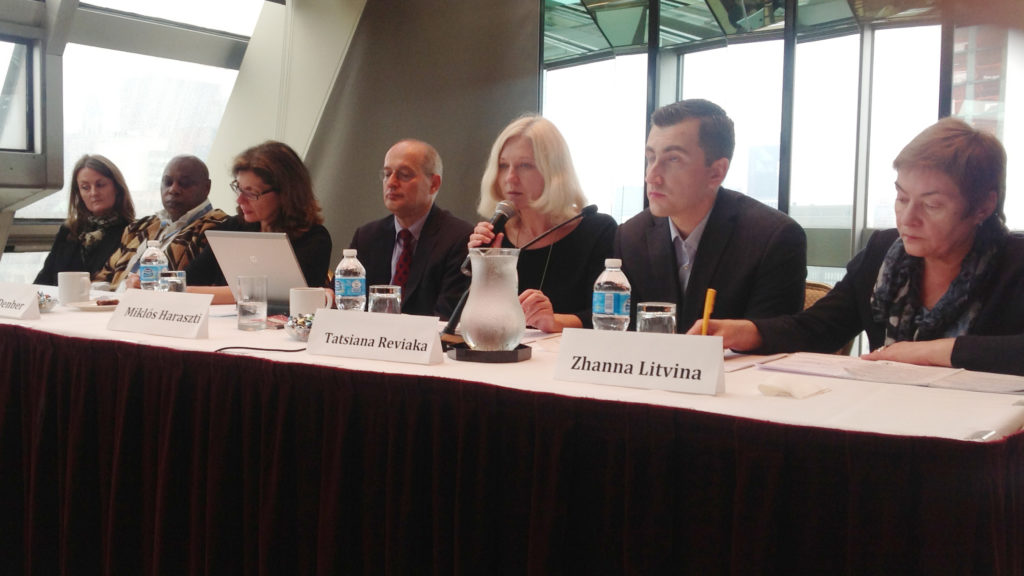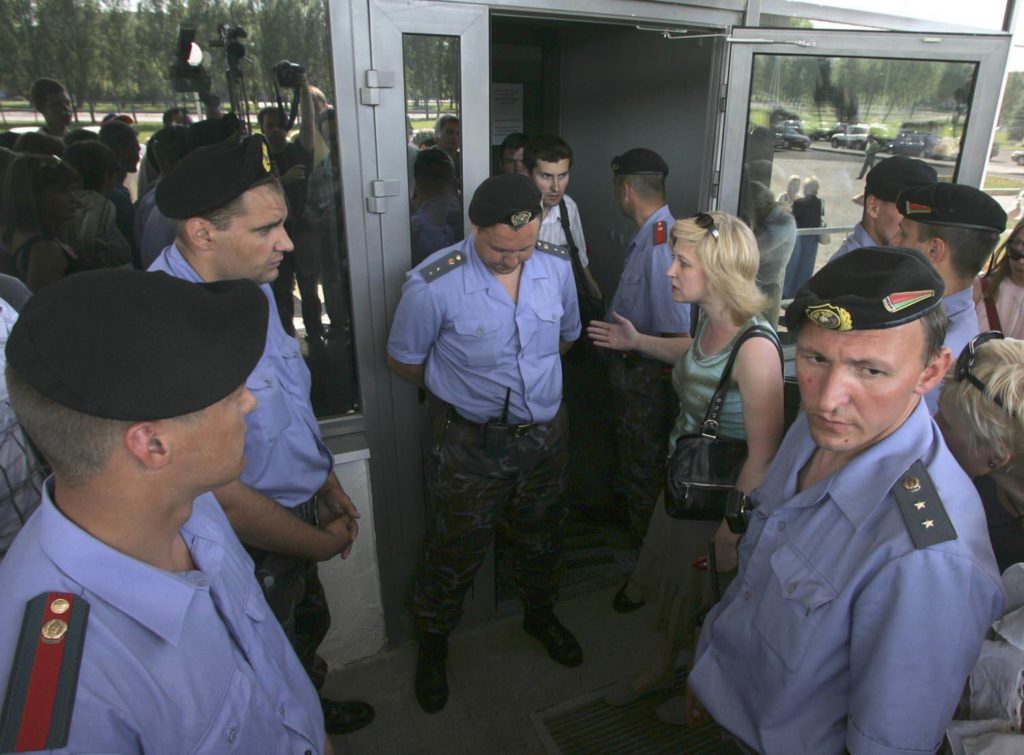In this Interview, Reviaka discusses the path that led her to become a human rights defender, from university student to leaving her job at the Maksim Bahdanovich Literature Museum to join the then-emerging Viasna. She reflects on Motherhood, the establishment of the Belarusian Human Rights House, as well as the human rights situations in Ukraine and Belarus. This interview, conducted by Yauheniya Stryzhak, for the Belarusian Human Rights House, was originally published in the Belarusian language.
University. Perestroika.
It was obvious that the change was coming and it was unstoppable, just waiting for a critical mass.
I was 17, a student — that was back in the USSR. I studied at the Faculty of Philology of the Belarusian State University. As a child, as a teenager, I was sure that once you started university, you would end up working in that speciality for the rest of your life. So I thought I would be a teacher.
Perestroika [a political movement for reformation within the Communist Party] began when I was a student. At university, you learned about the history of the Soviet Communist Party, the theory of scientific communism, and ‘socialist realism’ in literature… but when leaving the classroom, you see that all those theories are not capable of life anymore and are falling apart right before your eyes. Life was changing, and this change differed so much from our university program, which was clinging to the past.
Students took an interest in public life. The information about Kurapaty [the mass grave of victims of Stalinist repressions outside Minsk] came as a bombshell, as researchers started exploring that place… I didn’t attend the first protests in Kurapaty, but they were talked about at the university. Everyone was aware of them, we were all talking about them, but not openly — the Soviet Union was still alive, with its restrictions and cautions. However, it was obvious that it was impossible to restrain the coming changes. They were about to reach a critical mass.
Maksim Bahdanovich Museum
Everyone felt engaged in the events transforming the country by the minute.
I remember the beginning of the 1990s very well, with those live radio and TV broadcasts of the Supreme Soviet plenaries. I was on maternity leave — looking after my little child and listening to the radio or watching TV to follow the events. For me, the Soviet Union started falling apart right when the Declaration on State Sovereignty was adopted, when independent Belarus appeared to replace the Byelorussian Soviet Socialist Republic.
Having a young child, I was focused on my maternal duties and not involved in any other activity. However, back then everyone was interested in politics — that was the topic most often discussed among friends, neighbours, and even by young mothers looking after their babies at the playground. Everyone felt engaged in the events transforming the country by the minute.
I started working at the Maksim Bahdanovich Literature Museum in 1991. The museum was important in promoting the Belarusian national identity and culture.
I think everything depends on the people. Ales Bialiatski headed the museum at the time, and some of my former university course mates also worked there. So my work was a continuation of my personal relations — at a new location, and with a strong leader, who involved me in civil society activities.
Political prisoners and the spring of 96
Some of the rally participants disappeared — where could they be? How could we find them?
In the spring of 1996, very important events for the whole country took place — the independence of Belarus was under real threat from advancing integration with Russia. Authoritarianism was strengthening. Those threats energised people. Throughout the spring, mass rallies and marches were held in protest at Russia’s policy of takeover of Belarus.
This is when the newly-independent Belarus saw its first political prisoners. Slavamir Adamovich was arrested. More than 200 people were brutally detained after the Chernobyl march [on 26 April]. Yuras Khadyka and Viachaslau Siwchyk were sued for political reasons…
This was a new challenge — and someone had to address it. We had to start with the basics – some of the rally participants disappeared — where could they be? How could we find them? No one knew about Okrestin Street [the temporary detention facility in Minsk] — the name of this street is the first thing the modern activists learn about now.
After the mass arrests during the Chernobyl march — people would bring food to the museum to support the prisoners and their families. Their help was spontaneous. I remember our museum’s corridors cluttered with boxes. In the kitchen on the second floor, the museum staff were slicing up bacon for parcels for the prisoners. We did not perceive these events as being the beginning of some new stage in our lives.
The road to activism and the emergence of Viasna
I started doing what I was good at — collecting and processing information.
We continued working at the museum, but in 1998, Ales Bialiatski faced the choice — either to engage in civil society activities or to continue working as the museum director. He decided to quit and to set up an organisation – Viasna. He suggested that Palina Stsepanenka and I should quit too.
I had no clear idea of what we were going to do. “Human rights? I don’t know anything — I’m not a lawyer,” I said. They told me: “Tanya, you can write books, right?” So I started doing what I was good at — collecting and processing information.
That was not a concrete decision for me. I didn’t just wake up one morning and think: “There, this is my mission”. Leaving the museum for human rights was, rather, connected with the developments taking place in my professional life, at the museum… with my desire to work further with the people whom I trusted and respected.
For all of us, the first years in Viasna were a time of growth and formation of a human rights consciousness. I wouldn’t say that we made some mistakes, but we felt a lack of knowledge and of human rights-based approaches.
I learned about the human rights system later. It took me some time to understand them because my first impression of human rights protection was like packing food parcels, collecting information about detainees, running in and out of courts, and so on.
At first, I took part in short two- to three-day-long workshops and from this I gained only a fragmented understanding of human rights concepts. That kind of training provoked many questions but left them without answers.
I gained an understanding of human rights as a part of international law thanks to educational programs arranged by the Helsinki Foundation for Human Rights (HFHR). Only then did I slowly realise what it was all about. It was at this time, by the way, that I met the legendary Marek Nowicki.
It was attending the Higher International Course on Defending Human Rights in Warsaw in 2006 everything fell in to place. I consider my human rights work as divided into two chapters: before and after this milestone.
This course gave me a clear understanding of human rights with its goals, objectives and possibilities. Thanks to its systematic approach, I have enjoyed the results of that training throughout my life. My human rights work stands on the solid foundation laid by that course.
Motherhood and defending rights
I remember my daughter crying. She had just got a new job, and a week later, her employers asked her if it was true that Tatsiana Reviaka is her mother.
Our human rights work does not deprive us of our maternal responsibilities and the need to care for our children, families and loved ones. As a rule, I try to protect my family from the negative stuff which I sometimes have to face. If I am suddenly detained, everyone knows to not tell my mother, so that she doesn’t have to worry. However, it isn’t fully possible to entirely protect your loved ones when you are engaged in human rights work.
I remember my daughter crying. She had just got a new job, and a week later, her employers asked her if it was true that Tatsiana Reviaka is her mother. They told her she was well qualified for the position, but they did not want their business to be in the focus of the authorities, so they asked her to quit.
My daughter supports and loves me; nevertheless, we always remember those days when we were targeted by the security services. It was painful for me, as a mother. They never tried to pressure me by hurting my daughter or my loved ones, yet, I can see my loved ones affected by pressure on me personally, and it hurts my feelings. I think that men who are defending rights might also feel the same when their activities affect their families.
Belarusian Human Rights House
Let’s just say that, at the end of each day, those of exploring the streets of Vilnius would say, “Let’s go home!” Not just “Let’s go to the House”, but home, sweet home.
My very close relationship with the Belarusian Human Rights House began in 2007 – as soon as the House opened. Viasna arranged their human rights schools there. Our first schools were actually launched in 2006, but at first, we had to wander – arranging them at one place and then at another venue… It was very difficult to find a comfortable space for people who would have to spend ten days together.
A safe environment is very important for learning, team-building and inspiring for further activities. The House was a perfect space for all these goals.
Let’s just say that, at the end of each day, those of exploring the streets of Vilnius would say, “Let’s go home!” Not just “Let’s go to the House”, but home, sweet home, where everyone is friends, everyone understands, and everyone wants to help.
Since then, the schools have been hosted at the House every summer. They have become a very important part of both my work and my life. It took effort to take care of the House. It felt like my home that I had to take care of. Rather than just using it and leaving, I wanted to make it a better place. I became the third President of the House, after Zhanna Litvina and Barys Zvozskau.
Barys was an iconic figure for the Belarusian human rights community. He taught us that human rights are a part of international law and that activism on its own is not enough. His efforts brought international human rights law to the Belarusian rights movement. It raised the level of Belarusian human rights activities and integrated it into the international context, enabling us to speak the same language as international colleagues around the world.
He was the driving force in the establishment of the Belarusian Human Rights House, gathering the founding organisations around the idea of its creation. Initially, they planned to open the House in Minsk, but the authorities rejected the application. We are so grateful to Barys, that this rejection did not stop him or the co-founders and bury the whole idea. A solution was found, and the Belarusian Human Rights House was opened in Vilnius. Despite being in exile, its existence is important for Belarusian actors.
In 2010, Barys expressed his intention to quit as the President of the House due to health problems. The stakeholder organisations of the House suggested my candidacy, which was approved at the general meeting. I was the President for eight years, between March 2010 until the position was abolished in July 2018. It was a great experience and a huge responsibility, for which I am very grateful to my colleagues. I continued working for Viasna at the same time, also up to July 2018.
The need for the House was particularly clear following the crackdown in late 2010. Rather than a platform for education, it became a shelter for people fleeing Belarus after the dispersion of the Square [a Demonstration in Ploshcha which was broken up by police on 19 December] and a safe space for defenders to discuss their strategies for opposing repressions and helping victims. This was a very important role that the House played.
The imprisonment of Ales Bialiatski
We felt this support solidarity from our foreign colleagues all the time.
The arrest of Ales Bialiatski in 2011 was a severe blow and a great challenge, but Viasna did not stop working. We understood that while we were out of prison, not behind bars, the situation was harder for the head of our organisation, and it was our duty to go on. Bialiatski showed an example of invincibility in those difficult times. Viasna also sought to show that the authorities could not break us down by locking up our leader and expecting us to run and hide. It was important to demonstrate that we were still strong and active — although we felt exhausted sometimes.
Since almost all human rights protection instruments have been weakened or completely shut down in Belarus, advocacy at the international level remained almost our only way to influence the behaviour of the authorities. The House gave us access to an active international presence through the network of Human Rights Houses.
When Bialiatski was arrested, our colleagues from other Human Rights Houses would go to the Belarusian embassy in their countries and protest. The Houses made statements and would speak up at international institutions. We felt this support solidarity from our foreign colleagues all the time.
A lesson from Mika Danielian
We must look for occasions to celebrate and to rejoice in what life has to offer. We need to celebrate holidays and each other, we must show them that we are unsinkable.
After the crackdown of Ploshcha, an international mission was created to monitor the situation in Belarus. It included some of our colleagues from the Human Rights Houses. Defenders from many countries came to us when we were overstretched by massive repressions. They really helped us: they attended the courts when we lacked time, and they performed our work when we were exhausted. They didn’t just merely help out – they lifted us and gave us the support we desperately needed.
Unfortunately, a travel ban was imposed on many of them, prohibiting them from coming to Belarus for years to come. Nevertheless, they showed what it was to come to the rescue.
I will never forget the words of my colleague Mika, unfortunately, he is no longer with us. I was exhausted, an suddenly he said, “Tanya, let’s go listen to music! I’ll treat you to some wine”. I said, “Mika, you’ve got to be kidding me – I’ve got so many things to do… I just can’t!”
“This is exactly what the authorities want us to do — they hope that we will kill ourselves with these problems, that we will stop paying attention to each other and seeing the beauty around us, that we will not enjoy the sweetness of normal human life any more. That is exactly why we need to resist it! We must look for occasions to celebrate and to rejoice in what life has to offer. We need to celebrate holidays and each other, we must show them that we are unsinkable,” he answered.
That was an invaluable lesson for me on how to maintain dignity in the most difficult situation. How to not wear down, to not give up, or at least to not show it – to show that you are exhausted and can be destroyed. If you can smile in the most difficult situations, you are not yet defeated. Those who want to overcome us always notice this.
Maidan and the war in Ukraine
The situation in Ukraine makes it obvious that the work of human rights defenders is critically important in situations like these.
Undoubtedly, since the Maidan revolution in Ukraine, we have been carrying out our human rights work with the understanding of a key issue for our country — preserving our independence.
The understanding of the challenges and threats that Ukraine has faced and tried to struggle with for five years already – the persistent feeling is that we, Belarus, may be next.
In Ukraine, we see new challenges emerging for human rights defenders. People may feel compelled to defend independence, and that can cause them to abandon their human rights activities: they can take up arms and head for the frontlines. However, in times like these, it is obvious that the peaceful work of Human Rights Defenders is critically important and very much needed.
Someone has to be out there to give an unbiased and objective view of the situation, no matter what, and this is exactly the role of human rights defenders. Even when their own country is actually in a state of de facto war, they still work to hold authorities accountable and ensure that their governments respect human rights.
Belarus, election monitoring, and the UN Special Rapporteur
I believe in Belarus, and in Belarusians.
Elections in Belarus
Why do defenders observe elections when these elections are a sham? We do it to have evidence to prove that the results announced by Yarmoshyna [the head of the election authorities] are… not consistent with reality, to put it mildly.
We always hear: well what have you achieved if there are no changes? But what if all of those systematic violations year by year had not been recorded by human rights defenders? I mean the data that enables us to challenge the final figures in the election commissions’ protocols. Otherwise, statements about rigged elections would be without evidence: a case of your word against my word. Human rights defenders gather facts. Conclusions about elections in Belarus being fake are based on hard data.
Miklós Haraszti, UN Special Rapporteur on Human Rights in Belarus
Why does Belarus need a Special Rapporteur? This is the same as asking, “Why do we need human rights defenders?” What is the outcome of Miklós Haraszti presenting two reports on Belarus per year to the UN? These reports have been the most significant source of information about Belarus for the world. Through these reports, the international community is able to get a glimpse into Belarus and to develop their policies towards our country.
Without these reports by Haraszti, it would be much more difficult for us to spread the word about the situation in Belarus. Assessments of the human rights community are always in line with those of Miklós. We always agree on key points. However, as a Special Rapporteur, he has a stronger voice on the international arena. It would take an enormous effort for us to be heard on the same level, with probably more modest effects.
Belarus
The Belarusian authorities have just started attempts to understand what human rights are about. So far, they have only seen human rights activism as being a part of political opposition. They viewed human rights defenders as “public enemies” who only criticized the authorities. The point is to make a difference, not fighting for power. It is wrong to see us as political opponents; yet, this perception endures. The fact that we help the victims of political persecution can be one of the reasons. When human rights defenders help the political opposition that is suffering repressions, it can seem that we share the same goals.
After twenty years of ignoring their international human rights obligations, the government has slowly begun making little steps, such as the adoption of the inter-agency human rights plan, imperfect, but existent, I hope that we will see a transformation toward perception of human rights as a positive phenomenon, which is useful for the state. Hopefully, it will have impact on a better understanding of human rights defenders’ work, as well. Even if these are half-hearted and actually unwanted measures for the government, it is still new compared to what we had before.
Of course, I believe in Belarus, and in Belarusians. Also, I am confident, in spite of recent statements made by the Russian authorities, that Belarus will remain an independent state.
NEWSLETTER FROM HUMAN RIGHTS HOUSES AND HRHF
This article was published as part of the April newsletter from the Human Rights Houses and HRHF.
Sign up to receive future editions of the newsletter.
Interviews with Defenders from the Human Rights Houses
Olga Skrypnyk
Mamikon Hovsepyan
“When I was a teenager I left Armenia because, as a gay person, I felt unsafe. I moved to the United States and found it to be a huge change. After living there for about 4 months I felt that if I wanted freedom and peace, then I would have to earn it – and that I wanted to work for change in my country.”
Read more in The Reality of LGBT+ activism in Armenia.
Lara Aharonian
“In society, if we can resolve gender identity and orientation, other things would be very easy to resolve. Feminism is intersectional, you can’t raise the issue of patriarchy and only talk about women. Patriarchy attacks all kinds of people that aren’t the so-called social “norm”.
Read more in Fighting for Women’s Rights and Equality in Armenia.





